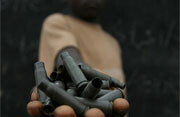As rebel troops rolled into the Chadian capital N'Djamena last month, commentators were once again ready to blame it all on the country's oil. Many saw the resource curse in action: An oil-rich country driven to civil strife by avarice and a sudden influx of wealth.
The headline on CNN immediately read: "Oil fuels ethnic violence in Chad." Environmental groups and human rights activists felt vindicated that their campaigns against the Chad-Cameroon pipeline would now be taken more seriously. Given that many view Iraq as an "oil war," there was a general presumption that the loathsome liquid was also the ultimate cause of this African conflict.
The connection between oil and conflict has been made since the earliest industrial uses of the fuel. Soon after the end of World War I, the French oil executive Henry Bérenger in a historic dinner speech alongside the distinguished British diplomat George Curzon said, "As oil had been the blood of war, so it would be the blood of the peace." If oil was part of the problem it would perhaps be part of the solution as well.
Nevertheless, we need to consider the complexity of conflicts in regions like Chad far more carefully before assuming linear causality. Civil war in Chad predates the discovery of oil by at least two decades, thus the underlying ethnic rifts may be a more profound determinant of conflict.
As the recent violence in Kenya shows, such visceral tensions can even escalate into violence in nascent democracies with not a drop of oil to fuel the rage. Yet, we must recognize that a sudden influx of cash without appropriate planning and with national asymmetries can be a recipe for disaster.
Extractive industries are a kind of windfall development similar to the establishment of a casino in an impoverished neighborhood. In order for an oil windfall to be successful in the long run, it must be coupled with development strategies that utilize the revenues and minimize its environmental impact. With the growing influence of globalization on national policies, some of the fears of resource dependency in Africa and its connection to corruption may be assuaged.
Take the example of Equatorial Guinea, which has been a languishing dictatorship since its independence from Spain in 1968 (although it nominally formed a constitutional democracy in 1991). Following the discovery of oil in the mid-1990s, the international community became more engaged with this tiny country. The United States reopened its embassy in Malabo in 2003, and the State department asserts that U.S. "intervention has resulted in positive developments," such as an office to monitor human rights in the country.
The viability of such a mechanism as a means of initiating change in Equatorial Guinea was tested by a recent scandal involving the alleged siphoning of oil revenues to an account held by President Teodoro Obiang's family at Riggs Bank in Washington, D.C. The account was linked to acquisition of property in the Washington suburbs, and this led to a U.S. Senate hearing on the issue and an investigation by the U.S. Office of the Comptroller of Currency in 2004.
None of this would have happened if Equatorial Guinea had not been brought to the world's attention by oil. Yet the onus for exerting such influence still lies with the international community. At the same time, the regulatory capacity of some African governments over oil activities has grown.
Some governments have gained expertise in the technical matters of the oil business, improving their capacity to negotiate concession contracts and regulate social and environmental issues. For example, Angolan authorities fined ChevronTexaco $2 million because of an oil spill in 2002. Despite a history of oil spills and pollution in the region, this was the first time an oil company was fined due to environmental degradation in Africa. ChevronTexaco also compensated local fishermen for losses in their incomes.
As peace returns to the streets of Chad, the eye of the international community should remain on how the oil revenues are managed and how the country ultimately plans for a post-oil economy. The elaborate system for revenue transparency that the World Bank set up for Chad's oil must be enforced.
Despite oil's tortured history and eventual demise as a fuel, it must not be summarily dismissed as a cause of turmoil in Africa. Rather it should be considered as a resource that needs to be managed with effective development planning.
![]() This article is licensed under a Creative Commons License.
This article is licensed under a Creative Commons License.
Please read our usage policy.




